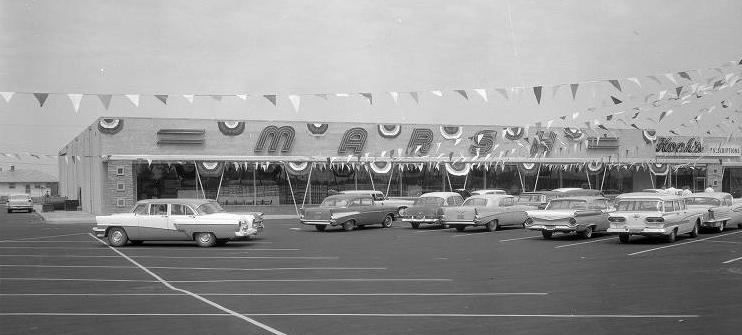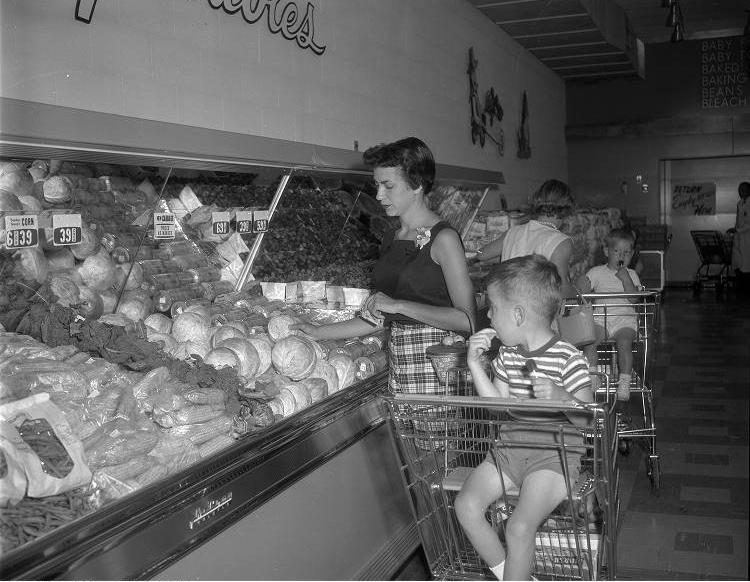Wilber Marsh opened the first Marsh grocery store in 1922 in North Salem, Indiana. By the 1930s, the family owned business had opened a chain of stores throughout Indiana and later Ohio. The first true supermarket appeared in 1947. Marsh stores incorporated as Marsh Foodliners in 1952, later known as Marsh Supermarkets.

The first Marsh supermarket in Indianapolis, located at 53rd Street and Keystone Avenue, opened in 1957. Marsh then increased its presence in Indianapolis to include 33 supermarkets and 66 Village Pantry convenience stores. In 1974, a Marsh store in Troy, Ohio, became the first store in the world to use a bar-code scanner. The scanner is part of the Smithsonian National Museum of American History collections.
Battling fierce competition from Kroger and Cub Foods, Marsh developed large one-stop-shopping stores, which included specialty foods and services, and claimed 30 percent of the Indianapolis market by the early 1990s. Marsh also stocked regional favorites in its stores, such as recipe pastries, cakes, and cookies.

In 1991, with roughly 40 percent of its stores in the Indianapolis area, Marsh moved its headquarters to nearby . By the mid-1990s, Marsh was the nation’s 38th-largest food retailer, accruing about $1.3 billion in annual sales and employing over 4,000 people from the Indianapolis area in its Marion County warehouse, stores, and corporate offices.
During these prosperous years, the Marsh family was very active in local philanthropic and civic affairs. Marsh contributed to the arts and amateur sports, as well as Indianapolis schools, churches, and museums, by sponsoring such programs and events as Symphony on the Prairie, , and Computers for Education. Marsh also aided local charities in fundraising and food donation programs and developed progressive environmental recycling and human services policies.
In 2001, Marsh purchased and Carter’s Supermarkets. Purchase of Mr. D’s Fresh Food Markets followed in 2003. With the acquisition of these smaller regional supermarket chains, Marsh eliminated some of its competition. Marsh retained the O’Malia name and elevated those stores for the upscale food trade. The other markets were rebranded as Marsh Supermarkets.
The company began to experience financial problems because of increased competition from Kroger and Meijer. (Meijer began opening stores in Indiana in 1994.) Marsh attempted to expand beyond its Indiana-Ohio markets in 2005, including the Chicago area, but those stores failed within a year. As company growth slowed and competition increased, Marsh explored options to sell the company.
In 2006, Sun Capital, a private equity firm located in Boca Raton, Florida, acquired Marsh for approximately $88 million. After purchasing Marsh, Sun Capital sold all non-core subsidiaries and closed low-performing stores. In 2007, Village Pantry was spun off as a separate entity under the private equity company umbrella. The company also replaced Marsh store-branded products with less-known Food Club brands. The Food Club brands brought bigger profit, but Marsh stores lost customers who had been loyal to the store’s own products.
In May 2014, Marsh opened its first store after the Sun Capital acquisition. The stores began offering home delivery through Instacart, joining larger chains such as Kroger in this venture in 2015.
During that same year, Sun Capital also made plans to update its Marsh stores and to open new ones but abandoned these plans within a year without comment. By early 2017, reports leaked to the press that some Marsh stores were struggling to pay rent. Sun also tried to sell Marsh headquarters in Fishers to raise funds.
Sun Capital Partners quietly sold controlling interest in Marsh to JT Grocery Consulting LLC, of Delaware, on March 24, 2017. At the end of December 2016, Marsh had 72 stores, within two months after Sun sold controlling interest to JT Grocery, 44 remained. In early May 2017, Marsh announced that finding a buyer for some of the remaining stores was urgent. Marsh subsequently filed for bankruptcy protection. In June 2017, the company announced that all stores would close.
Operation of Marsh and O’Malia stores ended on July 8, 2017. The bankruptcy left $80 million in debt to workers’ severance and pensions. Some of its stores have been repurposed, in Broad Ripple as a church and in Carmel as a temporary library location.

Help improve this entry
Contribute information, offer corrections, suggest images.
You can also recommend new entries related to this topic.




